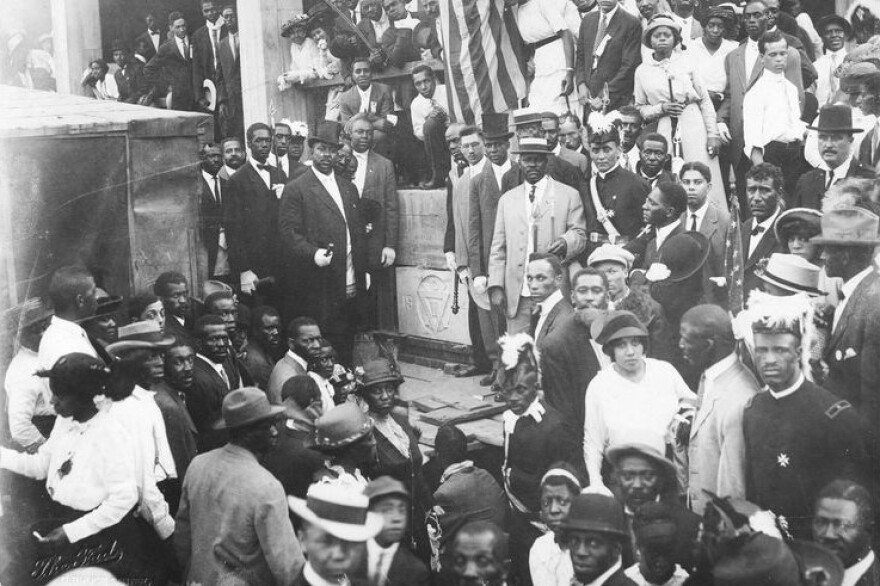Jeremy Drouin didn’t get into historical research work for the accolades, but that didn’t stop him celebrating last month when a local history project he’s been working on since 2014 won a national award.
“We were thrilled to get it,” said Drouin, who manages the Kansas City Public Library’s Missouri Valley Special Collections. “It’s rewarding when a national organization that promotes good history (says) your project is important.”
In June, the American Association for State and Local History recognized the Kansas City Black History project with its annual Award of Excellence, which will be presented at a conference this fall.
Drouin’s team at the library, along with the Black Archives of Mid-America in Kansas City, are responsible for most of the research and writing that goes into the project, which highlights the contributions of African American locals who shaped Kansas City and the nation.
Since 2010, the Local Investment Commission, the library, and the Black Archives have created annual booklets, posters, calendars, and, more recently, a website, all celebrating Black history in Kansas City. The partners last year printed a 44-page collection featuring the stories of educators, medical workers, entrepreneurs, civic leaders and more. 20,000 copies were distributed for free at library branches, schools, churches and community centers.
“We had people reach out to us and say, ‘we use the Black history publication in our Girl Scouts troop,’ or, ‘in our church group,’” Drouin said. “You know, teachers reaching out to us to say that they've been able to incorporate these stories (into lesson plans, and) highlight these incredible people.”
For the award’s judges, that feedback was critical.
“When we talk about community impact, we're looking for projects that not only bring to light some historical event or fact, but (also) explain why it matters — why it's relevant to people today,” said Aja Bain, who helps lead the awards program at the American Association of State and Local History, which provides leadership and resources for historical interpreters and preservationists across the country.
“Black history in Kansas City is not totally unknown, but there's never been a concerted effort to sort of bring these stories together,” Bain said. “The response, I think, just showed how much of a hunger there was for these essential stories that have been ignored and kept out of the record.”

Included among those stories is that of Lucile H. Bluford, a Lincoln High School graduate, journalist and civil rights pioneer who moved to Kansas City when she was 10 years old.
Bluford spent 69 years working at the city’s most prominent weekly African American newspaper, Kansas City The Call. She also served on the national board of the NAACP, and sued the University of Missouri in 1939 because her application to study journalism there was denied on the basis of her race. Though she lost the case, a journalism school was established at Lincoln University, in Jefferson City, under the "separate but equal" doctrine.
Over the years, poet Glenn North has had a hand in the project as an employee of three different local institutions: the Black Archives, the Bruce R. Watkins Cultural Center and the Kansas City Museum. North also wrote and recorded a poem for the publication, called "I Sing Their Names."
“You look at someone like Nikole Hannah-Jones and the work that she's done with the 1619 Project as a journalist. She's on a trail that was blazed by Lucile Bluford,” North said. “There's so much important history here, and so much in terms of art and culture that I think people overlook.”
The publication also features essays from contemporary civic leaders, like Kansas City, Missouri, Mayor Quinton Lucas and social justice advocate Justice Horn, currently a candidate for the Jackson County Legislature.
“The way that they sort of just took it beyond a history-gathering and interpretation project by actively involving contemporary leaders, that's not always a step that projects make,” noted Bain, of the history association.
The Kansas City Black History project also received awards in 2021 from the Jackson County Historical Society and the Missouri Library Association.
“These awards have been great. (It’s) extremely gratifying to receive them, but they've really been a springboard,” said the library’s Jeremy Drouin. “They've energized us really, to do more with the project.”
Drouin said that includes plans for a 2022 reprint of the physical booklet, with the addition of several new biographies.
“Kansas City Black history is more than Negro Leagues baseball and jazz and barbecue — those are important histories, for sure, and they're covered in the publication and on the website. But we also want to go into African Americans locally who made a name as artists, activists, educators, and really made strides in other fields,” he said. “My hope has always been that students are inspired by these stories.”






